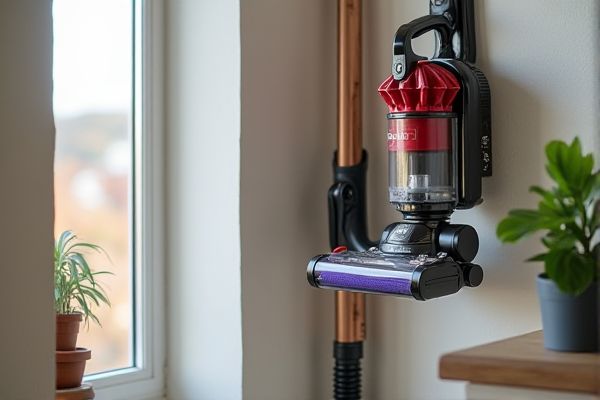
Wall-mounted vacuums offer permanent, space-saving installation ideal for quick cleanups, while shop vacuums provide powerful, portable suction for heavy-duty tasks and versatile use. Discover which vacuum type best suits your cleaning needs by reading the rest of the article.
Table of Comparison
| Feature | Wall-Mounted Vacuum | Shop Vacuum |
|---|---|---|
| Installation | Permanent wall installation | Portable, no installation needed |
| Power Source | Hardwired or plug-in | Electric plug-in |
| Storage | Fixed storage solution | Compact, easy to store |
| Capacity | Moderate, built-in tank | Large capacity for debris |
| Mobility | Limited, fixed location | High, designed for easy movement |
| Use Case | Home cleaning, convenience | Heavy-duty cleaning, workshops, garages |
| Power | Typically 500-1500 watts | Typically 1200-3000 watts |
| Cost | Higher initial installation cost | Lower initial cost, portable |
Introduction to Wall-Mounted and Shop Vacuums
Wall-mounted vacuums offer a space-saving design ideal for consistent dust and debris removal in garages or workshops, providing easy access and organized storage. Shop vacuums, known for powerful suction and versatile wet-dry cleaning capabilities, handle heavy-duty tasks like sawdust, liquid spills, and large debris. Both types cater to different maintenance needs, with wall-mounted models emphasizing convenience and shop vacuums delivering robust performance.
Key Differences Between Wall-Mounted and Shop Vacuums
Wall-mounted vacuums offer space-saving convenience and easy access for small to medium cleaning tasks, mounting securely on your wall to keep floors clear. Shop vacuums provide powerful suction ideal for heavy-duty cleanup, including wet and dry debris, with portability for use in garages and workshops. Your choice depends on whether you prioritize compact storage or robust performance for demanding cleaning jobs.
Suction Power Comparison
Wall-mounted vacuums typically offer lower suction power ranging from 2 to 4 amps, suitable for light cleaning and convenience in garages or workshops. Shop vacuums provide higher suction power, often between 5 and 7 peak horsepower, enabling them to handle heavy-duty debris, liquids, and industrial use effectively. The significant difference in motor strength makes shop vacuums better suited for demanding tasks requiring strong suction performance.
Installation and Portability
Wall-mounted vacuums require a fixed installation on a wall, often involving mounting brackets and access to a nearby power source, which limits their portability but provides easy storage and immediate availability. Shop vacuums, designed as portable units with wheels and handles, enable convenient movement across various workspaces without any permanent setup. The trade-off between these options centers on the wall-mounted vacuum's stable, space-saving design versus the shop vacuum's flexible, mobile functionality.
Noise Levels: Which is Quieter?
Wall-mounted vacuums typically operate at lower noise levels, often producing around 60-70 decibels, making them quieter than most shop vacuums, which can exceed 80 decibels. The design of wall-mounted units allows for sound insulation and placement away from work areas, reducing noise disturbance. Choosing a wall-mounted vacuum can help maintain a quieter environment, ideal for tasks sensitive to noise.
Storage and Space Considerations
Wall-mounted vacuums save significant floor space by being securely fixed to a wall, making them ideal for small workshops or garages where maximizing storage is crucial. Shop vacuums, while versatile and powerful, often require dedicated floor space and careful placement to avoid clutter, especially when not in use. Choosing a wall-mounted vacuum optimizes Your workspace efficiency by keeping the vacuum accessible yet out of the way.
Maintenance and Filter Replacement
Wall-mounted vacuums typically require less frequent maintenance due to their fixed installation and built-in dust collection systems, while shop vacuums need regular filter cleaning or replacement to maintain suction power because of their portable and heavy-duty use. Filter replacement in wall-mounted units often involves fewer steps with accessible filter compartments, whereas shop vacuums use various filter types such as foam, cartridge, or HEPA that demand more attention based on the debris type. Your choice impacts ongoing upkeep efficiency, with wall-mounted models offering streamlined maintenance and shop vacuums requiring more hands-on filter care for optimal performance.
Price and Value for Money
Wall-mounted vacuums offer a higher initial cost but provide long-term value through space-saving installation and consistent power supply, making them ideal for dedicated workshop setups. Shop vacuums tend to be more affordable upfront and versatile, suitable for various cleaning tasks but may lack the convenience and durability of fixed units. Assessing your specific needs helps determine whether the investment in a wall-mounted vacuum delivers better value for your workspace.
Best Applications for Each Type
Wall-mounted vacuums excel in garages and workshops where permanent, space-saving cleanup stations are needed for fine dust and light debris, providing easy access and consistent suction power. Shop vacuums are ideal for heavy-duty cleaning tasks, such as removing large debris, wet spills, and sawdust on job sites or construction areas, offering portability and robust motor capacity. Each vacuum type suits specific environments: wall-mounted units for stationary, routine use and shop vacuums for flexible, intensive cleanup demands.
Which Vacuum Should You Choose?
Wall-mounted vacuums offer space-saving convenience and easy access, ideal for quick cleanups in garages or workshops. Shop vacuums provide more powerful suction and versatile functions, making them suitable for heavy-duty tasks such as wet and dry debris removal. Choose a wall-mounted vacuum for compact storage and frequent light cleaning, while a shop vacuum is better for demanding jobs requiring maximum suction and portability.
 homyna.com
homyna.com